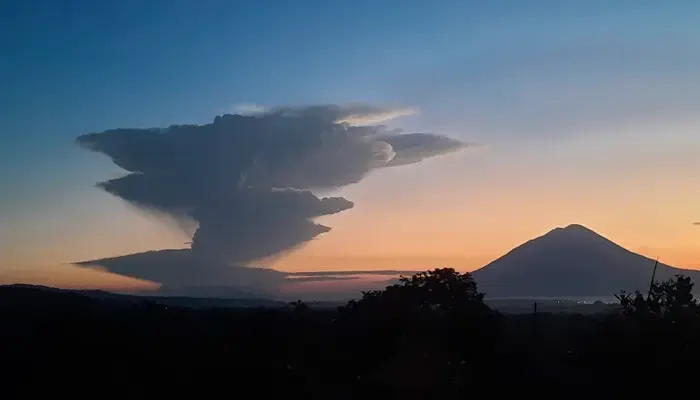FLORES TIMUR – Mount Lewotobi Laki-laki, a powerful volcano in south-central Indonesia, erupted on Tuesday afternoon, sending an enormous column of hot ash 10,000 metres (32,800 feet) into the atmosphere. The Indonesian Geological Agency reported that the ash plume expanded into a vast mushroom-shaped cloud visible from cities 90km to 150km away.
Authorities immediately raised the volcano’s alert status to the highest level and expanded the danger zone to an 8km (5-mile) radius from the crater. Local residents and nearby communities have been warned to remain on high alert, especially during heavy rain, which could trigger secondary disasters such as lava flows in rivers connected to the volcano.
The eruption was dramatic but, so far, not deadly. As of now, no casualties or property damage have been reported.
Flights Operating Normally Despite Towering Ash Cloud
Despite the size and scale of the eruption, Indonesian aviation authorities have not reported any immediate flight cancellations or disruptions. Air traffic remained under careful monitoring, with regional airports placed on standby for possible updates or rerouting instructions.
This eruption follows a deadly event at the same volcano in November, which killed nine people and injured dozens. Authorities are closely observing any further volcanic activity and have increased coordination with disaster management agencies to prepare for possible evacuations or emergency responses.
Authorities Warn of Rain-Triggered Lava Flows
The Indonesian Geological Agency has urged residents to be cautious, especially in regions where rivers originate from the volcano. There is a growing concern that ongoing or sudden heavy rainfall could trigger dangerous lava flows—known locally as “lahars”—which can travel quickly and unpredictably, endangering villages and farmlands downstream.
“Communities living near rivers that stem from Mount Lewotobi Laki-laki must stay alert,” the agency said. Emergency response teams have already begun mapping high-risk zones and ensuring that communication lines remain open between affected communities and local authorities.
Climate Change Adds New Pressure to Indonesia’s Volcanic Risks
Experts warn that climate change could worsen the impact of volcanic eruptions in Indonesia by increasing the intensity and unpredictability of rainfall. Heavier downpours raise the risk of lahars and landslides following eruptions, especially in densely populated areas.
Climate scientists have also noted how rising temperatures and altered weather patterns could affect groundwater pressure and other geological dynamics, potentially influencing volcanic activity. In Indonesia, where dozens of active volcanoes are surrounded by large communities, the combination of natural hazards and climate-driven stressors demands urgent preparedness.
The Indonesian government is currently working on climate-resilient disaster management strategies, integrating real-time monitoring systems, early warning alerts, and evacuation planning to minimize loss of life and damage.
Indonesia’s Volcanic Ring of Fire Remains Active
Mount Lewotobi Laki-laki is one of 120 active volcanoes in Indonesia, a country of more than 270 million people that sits on the seismically active Pacific “Ring of Fire.” The region frequently experiences earthquakes, eruptions, and tsunamis.
The volcano, standing at 1,584 metres (5,197 feet), is known for its twin structure. Its companion, Mount Lewotobi Perempuan—meaning “woman” in Indonesian—remains relatively calm compared to the erupting Laki-laki, which means “man.”
Just last year, on October 27, Mount Marapi in West Sumatra—one of Indonesia’s most active volcanoes—also erupted, underlining the persistent geological volatility of the nation.
As monitoring continues and the danger zone remains expanded, Indonesian authorities are urging preparedness and cooperation from the public to ensure safety in the days ahead.
